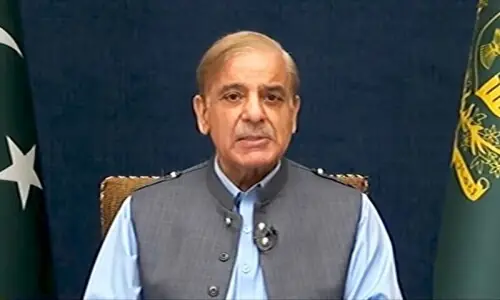Waves of nostalgia washed over this writer when one heard one of the pioneers of pop music in Pakistan, Alamgir in the studio with his simple yet soulful rendition of the Bengali folk song Amay Bhashaili Rey. This version featured a collaboration with Fariha Pervez who marks her entry into the song with Saiyyan Bina Ghar Suna.
The song — which featured in Alamgir’s second album — is no stranger to Pakistani audiences as it is one of the Pakistani-Bengali singer’s most well-known compositions. The version that he sang in Coke Studio is more of a ballad and both of the artists have sung it with such heartfelt emotion that it resonates with the listener long after the song has ended.
According to the official Coke Studio website, “The overall piece is a glimpse of a bridge to the past, asking what it truly means to belong in the face of displacement and how our choices make a difference in the world today.” This couldn’t have been said more beautifully.
Although one was introduced to the music of Rostam MirLashari only a few years ago, one has been following his journey and his music avidly ever since. Hailing from Zahedan, the capital of the Sistan and Balochistan border province in Iran, MirLashari is equally popular on both sides of the divide.
Owing to political unrest and fearing for his life, he fled to Sweden in the early ’90s and established a band called Golbang. Culturally diverse, the band contained musicians from various European countries, Balochistan and Africa.
It was MirLashari’s collaboration with the Norwich Group on the Balochi folk song, Biya O Mureed (based on the Balochi folk romance of Mureed and Hani) that introduced one to his music. For the studio, he sings Laila O Laila, another popular Balochi folk song from this side of the border. The song was first made popular by pioneering Baloch folk musician, Faiz Mohammad Faizok and is an upbeat happy number that serves to lift the spirits of those listening to it.
Where in Alamgir’s rendition of Amal Bhashaili Rey, the cello made a special appearance, in MirLashari’s Laila O Laila, it is the accordion as well as the Balochi dumboora. In fact, in the video, the accordion player seems to be having a ball of a time playing along to Laila O Laila. The spirit in both the audio and the video of the song is somewhat heartwarming.
The young and gifted Zoe Viccaji brings to the studio her version of the Turkish song Üsküdar’a Gider Ýken. The melody of the song has been reinvented and reintroduced many times over the years in many places all over the world and will sound familiar to local audiences. Viccaji has collaborated on her version of the song, titled Ishq Kinara, with Turkish singer Sumru Aðýryürüyen. According to Aðýryürüyen, “While Üsküdar’a Gider Ýkenstems from the old Anatolian neighbourhood of Üsküdar in Istanbul, the Turkish version’s roots connect even further to several other countries — Bosnia, Scotland, etc.”
Where Viccaji is featured through most of the song, and sounds quite pleasing to the ears, it is Aðýryürüyen’s haunting rendition of the Turkish version, Üsküdar’a Gider Ýken, which easily steals the show. There is a depth to her singing, perhaps due to her being a more experienced performer, and an authenticity, perhaps due to her connection with the original version, that pierces through the song. One would’ve liked to hear more of her. The Turkish version of the stringed instrument, the kanun, is also featured heavily throughout the song giving listeners a flavour of what Turkish folk music sounds like.
Although Assad Abbas puts up a mighty effort with his rendition of Mahi Gul featuring Fariha Parvez, the song seems a little misplaced and the music a little mismatched. When put together, it failed to create any real impact. Which is somewhat of a pity, since Abbas really does seem to put his heart and soul in his singing of this song.
The episode overall was a treat to listen to, not only in its variety but also in the sheer nostalgia that it evoked. From Istanbul to Balochistan to Bengal — music journeyed across different parts of the continent not only showing the diversity that existed in this region, but also what elements hold us together.





































